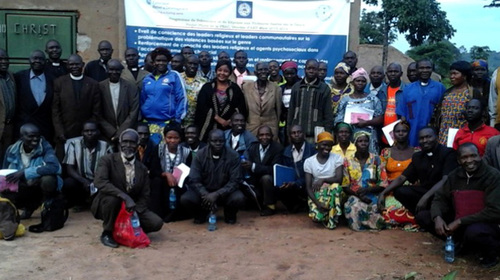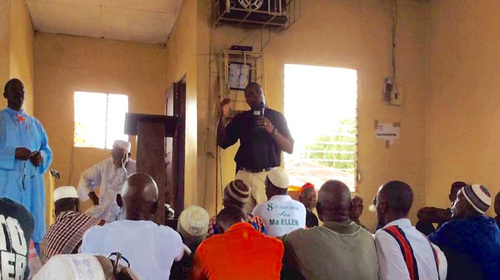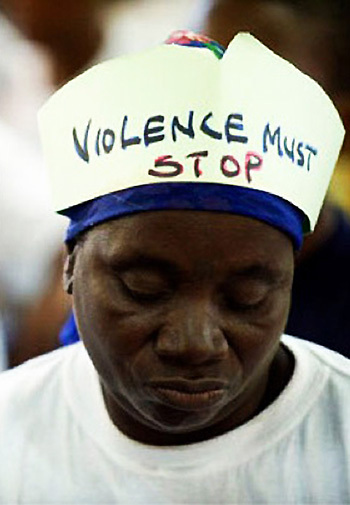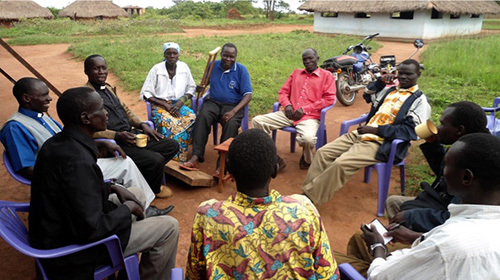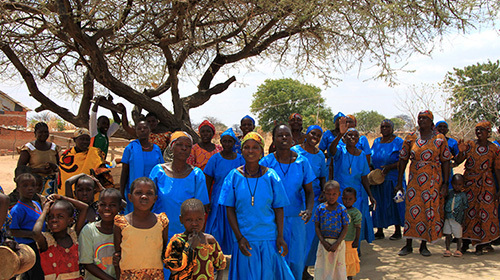As a husband, father and president of a faith-based organization, I have the privilege of being surrounded by strong women at practically all times. At home, my wife and my daughter challenge my ideas about... well, most things, from my views on current events to how I manage the mystifying array of technology required simply to watch the evening news on television. At work, not only are our heads of operations and programs both intelligent women, but like most non-profit organizations and especially faith-based ones, over half of our staff and Board of Directors are as well. There seems to be no shortage of empowered women around me. However, as President of Episcopal Relief & Development I am all too aware that is not the case around the world. The pursuit of true gender equality takes commitment and effort from both sides*, and the question often comes up: what is men's role in this?
The Episcopal Church in Liberia has an answer. Recognizing that sexual and gender-based violence (SGBV) is a persistent and preventable cause of harm to women, which affects their physical, emotional, social and economic health, they resolved to use their leverage as a trusted and widespread institution, to address this issue. The Church in Liberia already has many programs that empower women economically, but now they are specifically engaging men and boys in examining the root causes of SGBV and dismantling them.
In one part of the program, through an interfaith collaboration, priests and imams analyze religious texts that can help or harm the cause to end violence against women. They challenge themselves and others to use the Bible's and Qu'ran's messages of peace and understanding to challenge socially ingrained attitudes and behaviors that perpetuate SGBV. In another part of the program, Christian and Muslim male youth leaders discuss how social and cultural norms on gender roles disempower both men and women. Questioning assumptions enables faith and youth leaders alike to arrive at a new vision of equality - one where nothing has been taken away from them, such as masculinity or power, but where both men and women are empowered to move forward together.
A global epidemic, 1 in 3 women have experienced physical and/or sexual violence in their lifetime. And because this issue touches every geographic area and socioeconomic level, large-scale and collaborative efforts are needed in order to bring the attention and action needed, as reflected in the Sustainable Development Goals.
From the faith perspective, church leaders in both the pulpit and the pews are in a unique position to bring awareness, support and education to congregants and the wider community. Many centers of faith have the power to change violent behavior and practices, especially when we can collaborate with local government, social service providers, youth coalitions and other community groups; it's an enormous opportunity and privilege.
In 2013, Episcopal Relief & Development co-founded the US-based We Will Speak Out (WWSO) coalition, which brings diverse faith groups and other leaders for social action and advocacy together to end all forms of violence against women and girls. The first stage has been to end the silence that has cloaked the issue across communities, but particularly within faith communities. We partner with regional leaders and grassroots organizations to engage men and women through a series of social and economic programs and initiatives, grounded in the spiritual belief that transformation is possible. The next stage underway involves education and awareness around SGBV within the faith and wider community.
Women's voices are critical to the change we seek, especially those who have endured and survived violence. However, bringing an end to SGBV and building a just world must also include men speaking out and becoming advocates for change. That's why on Monday, March 14, 2016, we will be casting a bright light on men of faith who are championing this cause in their communities.
In a parallel event to the 60th United Nations Commission on the Status of Women (#CSW60) that convenes in New York, March 14-24, We Will Speak Out will bring together an international, interfaith, and intergenerational panel of men to share their wisdom, commitment, and first-hand experiences of how they are engaged in the critical process to end violence against girls and women. Engaging Men of Faith to be Champions in the Fight to End Sexual and Gender-Based Violence will be moderated by Jimmie Briggs, Co-Founder and Executive Director of the Man Up Campaign.
It's our hope that by highlighting the voices of men seeking to confront the issues of abuse against women, and supporting them to challenge violent attitudes in their own communities we will together positively impact the lives of women and girls.
Please take the time to share how you or your community are addressing Gender-Based Violence in the comments below.
----------------
Images in blog: First, men and women gather after activities around SGBV. Second, Christian and Muslim men gather to discuss SGBV. Third, women wears hat to raise awareness about SGBV. Fourth, a small community gathers to discuss SGBV.
*It is well worth mentioning that reducing any inequity requires effort from both sides of the power balance; this scenario discusses women's empowerment in particular, but the same framework could be applied to empowering and reducing violence against LGBTQ and gender-nonconforming individuals and communities, people and communities of color, etc., by educating and engaging those in the non-marginalized group as allies.


